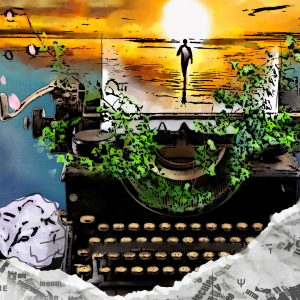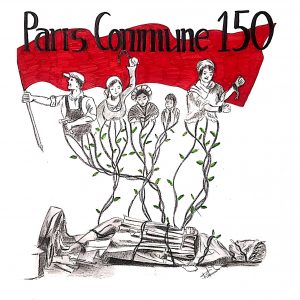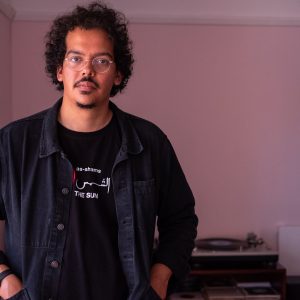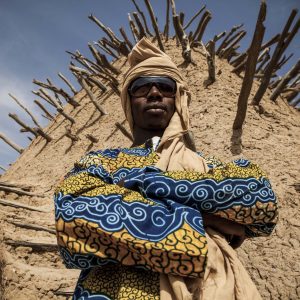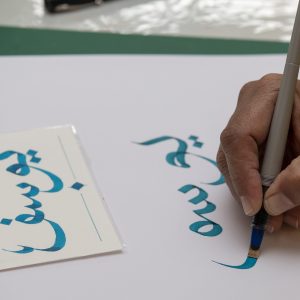Long Read | Bheki Peterson and the art of hopeful futures
In his scholarly and creative work on performance – including popular political, cultural and literary forms – the late intellectual showed us how to move our narratives forward. But he was not don…
Author:
25 June 2021

In the middle of a Covid-19 third wave in South Africa, we gathered around computer screens in our homes, joining – in spirit – those physically present to lay Professor of African Literature at the University of the Witwatersrand, Bhekizizwe Peterson, to rest on Tuesday 22 June 2021.
It is a statement of fact which seems unreal, not because death feels hard to comprehend, but because he still had so much left to teach us. As colleagues from the research initiative Archive and Public Culture (APC) – based at one of his three alma maters, the University of Cape Town (UCT) – remarked this week, Peterson was “at the height of his powers” and a scholar “whose work was not yet done”. Wits University Press, publisher of three of his books, called him a “great South African intellectual”.
Speaking at the funeral, his colleague and friend of many years, Isabel Hofmeyr, Professor of African Literature at the University of the Witwatersrand, characterised Peterson’s output by pointing to the different formats he espoused – creativity, intellectual vigour and balanced engagements inside and outside the academy. She went on to describe his output as astonishing – pointing out the hundreds of students he supervised, plus the thousands he taught.
Loved by many
In one sense, a virtual funeral seems a cruel irony for a man who spent so much of his life building a tangible intellectual community, who knew how to be present in the lives of others, be they students, friends or colleagues. At a different time, throngs would have shown up to bid him farewell, and to remind his wife Pat, son Neo, daughter Khanyi and his larger family of how much we loved him too.
At the same time, Bheki’s imagination was expansive. If people could reflect on their own funerals, he would have offered an observation at once incisive and dryly humorous. He was an intellectual attentive to the shifts in social mores and constantly evolving imagined cultures – even under conditions of strain, and across timelines. He would also have been touched by the outpouring of grief.
Related article:
A few years ago, when I visited him as he recuperated at home after hospitalisation for a congenital heart condition, he shared how taken aback he had been by the outpouring of well-wishes. He was surprised by how much he meant to people. I witnessed his generosity, kindness and gentleness with students and colleagues alike, and saw his adoring playfulness whenever the growing Neo or Khanyi came to the department – so I understood what drew people so strongly to him.
I agree with the APC that Bheki died before his work was done. And I refer, firstly, to the work he had dedicated his academic and creative career to, not as distinct trajectories, but as intertwined explorations of language, form and a set of concerns.
In a recent publication called Spectrality and Intergenerational Black Narratives in South Africa, he worries that it may no longer be clear why narrative matters. He takes this as an opportunity to draw attention to the paucity of trans-generational reflections on Black intellectual narratives as a way of engaging both history and cultural memory.
Related article:
Writing about Bhekizizwe Peterson requires paying attention to the many strands of his contribution to different aspects of South Africa’s intellectual and cultural life, as well as Black academic presence in the South African academy. It requires writing about Bheki as well as about Bhekizizwe Peterson. He was both. And he cared deeply about how stories were selected, crafted, told, when and why.
As a scholar preoccupied with archives across a four-decade career, Peterson understood that, as art historian Nontobeko Ntombela teaches us, archives of Black brilliance are both scattered and fragile. Yet tend to them we must, with determined curiosity, attention, humility and respect.
Peterson was doing that work when death came for him – tending to the Black archive, revisiting its narratives and retelling some. His work was not done.
Encounters
For 11 years, I taught alongside Bheki in the African Literature Department at the University of the Witwatersrand. However, I first met him at a screening of his film Fools (then a work in progress) at Inter Action, an annual postgraduate literature conference.
Most of us had read Njabulo Ndebele’s short story Fools at least once. It is this story that Peterson adapted for the film.
He and Ramadan Suleman had also chosen to name their film-production company Natives at Large, after a line from Sol Plaatje’s Native Life in South Africa, a pioneering text on the effects of the 1913 Native Land Act and resistance to it.
Bheki was completing his PhD and the film while also lecturing at the Department of African Literature at the University of the Witwatersrand. The Fools audience shared a feverish passion for literary and cultural analysis. None of us knew anything about making a film, but we all possessed the forceful certainty of people in their early 20s. In the discussions that followed, and in the midst of an exchange that moved from interesting to exasperating, Ramadan and Bheki were gracious and patient, although I am certain they must have second-guessed their decision to participate.
Related article:
Fools would go on to garner critical acclaim.
His dissertation became his first book – Monarchs, Missionaries and African intellectuals: African Theatre and the Unmaking of Colonial Marginality. Here, as elsewhere, Peterson showed how theatre offered “the potential to give meaning to individuals’ experiences of social processes and transformations”. It is a theme he touched on in his 1990 essay as well, Apartheid and the Political Imagination in Black South African Theatre.
Peterson was as curious about Black intellectual histories as he was about creative cultures and archives. In The Archives and the Political Imaginary, published in 2002, he writes about Herbert Isaac Ernest Dhlomo’s appreciation of archives as “a crucial component of the active labour of creating the political imaginary, that is, the intellectual and cultural horizons that shape our grasp of personal and social identities and histories: where we come from and where we are destined”. This orientation attributed to Dhlomo is everywhere present in Peterson’s own scholarly writing.
Four years later, when Peterson published a chapter titled The Bantu World and the World of the Book: Reading, Writing and Enlightenment, in the book Africa’s hidden histories: Everyday literacy and making the self, he revisits this connection with Dhlomo, writing: “Ever mindful of the confluence between social context and cultural practice, I am interested in the myriad ways the African intelligentsia drew on the ideas of reading and writing to imagine, improvise, proclaim and perform its senses of individual group identity.”
In another place, writing about post-apartheid popular cultural forms in Kwaito, ‘dawgs’ and the antimonies of hustling in 2003, Peterson is engrossed in a “larger scholarly project that celebrates and investigates the singular role and power of cultural practices in the making of the Black public sphere in South Africa”.
Overlapping curiosities
When we pay attention to the themes Peterson routinely returned to even outside his scholarship, it is evident that his creative and academic work cannot accurately be read as running parallel or even as adjacent spheres of excellence. They are better read as different explorations of overlapping curiosities. We do Peterson a serious disservice when we read his preoccupations with the past, the social imagination (in his earlier work) or imaginaries (in his recent work) as accidental or, simply, as work merely linked, thematically, across the genres he works with.
There is a way of reading Peterson’s scholarly project as an articulation of trans-generational Black intellectual and creative genealogy. Seen like this, we begin to understand his scholarship on performance and popular political, cultural and literary forms as a concern with the registers that make such a canon possible.
Such orientation is staged in his detailed and sustained interest in the specific works of figures including the Dhlomo brothers (Herbert Isaac Ernest Dhlomo and Rolfes Robert Reginald Dhlomo), Plaatje, Miriam Makeba, Ndebele, on the one hand, and the registers of kwaito aesthetics and contemporary movements, on the other.
Related article:
Importantly, we have to read across the boundaries of genre and location, not within categories, to make sense of Peterson’s long-standing intellectual investments. Troubling the boundaries of discipline and genre is best illustrated by using the example of one intellectual and writer whose work he returns to – Njabulo Ndebele.
Ndebele, whose work has been fundamental in shaping Peterson’s (and my own) intellectual preoccupations, offers several highly productive directions for a scholar as interested in intellectual lineages as in creative register.
In one strand, creative engagement with Ndebele’s world of ideas is through adapting the short story into the film Fools. Elsewhere, Peterson uses Ndebele’s cultural theory to think about the connection between Black arts and public culture at a time when conventional academic wisdom focuses on resistance and protest.
Instead, Peterson turns to Ndebele’s cultural theory to explore how exactly we might think of Black creative work as crafting alternative public cultures under apartheid. Extending this further, still, Peterson investigates creative cultural shifts and continuities in new popular cultures, post-apartheid.
Related article:
If we stick with how Peterson engages Ndebele’s oeuvre here, then we are also able to see how his scholarly essay on kwaito, and a film project such as Zulu Love Letter, ask similar questions. Peterson understood that a single question yields different responses when approached from different genres.
Ndebele is both crucial and replaceable here. A Plaatje scholar, who is also located in the tradition of Plaatje, such as Sabata Mpho Mokae, may find more value in reading Peterson as an heir to the Plaatje tradition.
That both these arguments are supportable with references to Peterson’s work illuminates the Black intellectual and creative genealogical work Peterson leaves for us to continue. This is part of our loss: that Peterson has been taken from us without this illumination. In her address at the funeral, Hofmeyr reminded us that Peterson also worked in the tradition of Es’kia Mphahlele, the founder in 1983 of the University of the Witwatersrand department in which we all taught.
Intellectual locations
In addition to being in the tradition of previous generations, however, Bhekizizwe Peterson was also part of a generation of Black academics who started their academic careers in the late 1980s and very early 1990s, “before the end of apartheid and therefore at the height of white academia. This means their formative years as young academics were spent in a much more structured racist environment that was legislatively enabled by the laws of the land,” Angelo Fick reminds me.
This cluster, which can also be seen to include scholars like Desiree Lewis, Elaine Salo, Sibongile Muthwa, Shamil Jeppie, Shireen Hassim and others, also marked an epistemic shift whose effects are understudied and largely unremarked on, perhaps because they are still in the academy.
Unlike the members of the Black-academic generations before them like Lewis Nkosi and Mphahlele who invited questions about the subjects of study, Peterson and his peers’ entry marked a decided shift in the very procedure and tools of analysis and disciplinary boundaries of the South African academy.
Their earliest publications also chart an engagement with global academic trends in ways that differ markedly from the bulk of the work of their white academic peers working in a mostly insular South African academic tradition. The Mamdani affair famously highlighted this insularity of the South African academy, with UCT insisting on an “African studies” without any engagements with African intellectual debates or those from countries outside southern Africa.
Related article:
One of Bheki’s friends, architect Mphethi Morojele, pointed out at the funeral that there were “13 African students at UCT” when he and Bheki were undergraduates. There would have been even fewer postgraduates and entry-level academics later. This is part of what Shireen Hassim gestures to when she remarks in a different context of ahistorical analytical questioning: “If I could work only with people with whom I shared an ideological or political affinity, I would not have been able to work in the academy.”
When people of Bhekizizwe Peterson’s age die way before they retire, “we end up memorialising them long before they have been institutionalised”, Fick said. “[Peterson] will not become an Emeritus Professor, have spaces named for him in a metaphorical sense and therefore live the kind of legacies the generation before him did. With his death, there is now a gap. There is an intellectual tradition that could have cohered around him had he gone on to become an Emeritus Professor and produced material into and beyond retirement. Unfortunately, what we now sit with is this gap that has to be mourned.”
Finally, as conservative as institutionalisation is, it remains “quite central to transforming some of the impulses and trajectories that tend to exclude intellectuals committed to a Black politics” like Bhekizizwe Peterson, continued Fick.
Black intellectual genealogies
My use of “generation” in this article is somewhat deceptive, since those of us who entered academic careers after Peterson’s cohort did so under different legislative structures in the mid-1990s. While the crude racism and white hostility was still residual in the organisations we stepped into, it was no longer structurally supported by the law.
Other kinds of shifts would mean that those starting in the 2000s would come in under different conditions still. Five-or-so years do not a “generation” make, if we are thinking in calendar-age terms. Although clusters may make better sense, they hide the time-specific experiences and strategies of successive Black academic waves in the last few decades.
Not institutionalised and understudied, we run the risk of losing a valuable and instructive moment in Black intellectual genealogies, ironically embodied by the very generations that have produced the kinds of intellectual projects Peterson has. This gap is the danger of his incomplete work, a gap that needs the kind of attentive studying with which he tended to the work of previous generations, and not a quick cartographic project.
Related article:
There is another area of illumination in tracing the specific histories and practices of the African literature department to which he dedicated most of his career. As a student and later professor at this department, Bheki was an important part of its unique culture, one of a kind in the South African academy – a breakaway from the English Department tradition.
It was not accidental that the department drew from the intellectual traditions of the whole continent – disloyal to the divisions of Francophone, Lusophone and Anglophone Africa, but attentive to the different ways they produced knowledge. It is a department that continues to take the debates about the academy seriously. And these debates, which include calls for the abolition of the English department, stretched to suggestions of establishing a literature department as we see in the East African academy, as taken in different directions in Uganda, Kenya and Tanzania.
Long before the South African academy grew preoccupied with debates around decolonising the academy and the disciplines, this department was grappling with the different ways in which African intellectuals have theorised, debated and experimented with what this means. It always demonstrated the kind of “nuanced awareness of the complex social factors and intellectual traditions that have shaped Africans”, as Peterson wrote in The Archives and the Political Imaginary. To come from a Black intellectual tradition, while contributing to the survival and generation of further tributaries, is both a collective and an individual pursuit. Bhekizizwe Peterson and his generational cluster understood this.
Collective commitment
Finally, in a process of continuous co-creation, in the tradition of Mphahlele, Peterson and his peers, Hofmeyr, Ogude, Ojwang, the late Phaswane Mpe and others reflected on what it might mean to occupy a department differently by creating cultures informed by the many rich debates in academic literary spaces across the African continent.
This spirit informed not only the very debates about structuring and continuous course redesign, but material reallocation of resources. One example was the pooling of funds from research publication subsidies for collective use to support emerging and shifting needs of postgraduate students in the Department of African Literature. It was part of the collective commitment to building the next generation of African intellectuals.
Related article:
Another is the annual Es’kia Mphahlele Postgraduate Colloquium and Arts Forum, modelled on the graduate literary conferences of our own graduate-student days, and named after the founder of the department. Insisting that each academic staff member take on the task of commenting and acting as discussant on a handful of student conference papers was another tangible contribution in socialising young scholars into academic careers and publishing cultures. Bheki took particular joy in retaining a hands-on approach in this colloquium, a task that came with considerable labour and many other invisible commitments too numerous to list.
Honouring Bhekizizwe Peterson lies in the collective recognition of the work he put into his own intellectual and creative outputs, the building projects he co-created and contributed to and many sometimes hidden, intangible ways in which he occupied a Black intellectual and creative tradition and its hopeful futures.

